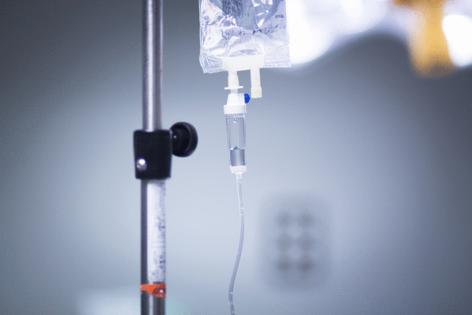Following Hurricane Helene, Baxter doesn't expect to return to normal supply of IV fluids until end of 2024
Published in Business News
It could be months before Deerfield-based Baxter International is able to fully ramp back up its supplies of IV fluids, after its largest manufacturing plant was damaged by Hurricane Helene, Baxter said Wednesday – something that could have serious implications for hospitals.
The hurricane last month led to flooding at Baxter’s North Cove plant, in Marion, N.C., forcing the company to temporarily shut down the facility. That plant was the largest manufacturer of intravenous and peritoneal dialysis solutions in the U.S. Intravenous solutions are used in hospitals and other care settings to deliver medication, keep patients hydrated and/or address electrolyte imbalances.
Baxter said in a statement Wednesday that its goal is to return to 90% to 100% allocation of certain IV solutions by the end of 2024, by re-starting the plant in phases and by importing products from other Baxter facilities.
For now, Baxter is limiting how much customers can order based on their past purchases, medical necessity and inventory, allowing them 60% of what they normally get. Baxter is also ramping up production of the products at its plants outside of the U.S. to help fill the need.
“We will spare no resource — human or financial — to restart operations and help ensure patients and providers have the products they need,” Baxter CEO Joe Almeida said in a statement Wednesday.
The plant’s closure has sparked concern from hospital and health care leaders across the country, though the U.S. Food and Drug Administration had not declared an official shortage of the solutions as of Wednesday morning.
The president and CEO of the American Hospital Association, Richard Pollack, wrote a letter to President Joe Biden on Monday asking him to direct the F.D.A. to declare a shortage of sterile IV solutions, which would give health care providers more flexibility. He also asked the administration to declare a national emergency and invoke the Defense Production Act to help spur more production of IV solutions.
“Our members are already reporting substantial shortages of these lifesaving and life-supporting products,” Pollack wrote. “Patients across America are already feeling this impact, which will only deepen in the coming days and weeks unless much more is done to alleviate the situation and minimize the impact on patient care.”
On Tuesday, U.S. Sen. Amy Klobuchar (D-Minn.) wrote a letter to the head of the U.S. Department of Health and Human Services, asking the department to use its authority to address the situation.
“As a result of Hurricane Helene, hospitals, dialysis centers, and other health care providers around the country — including many in Minnesota — are already being forced to ration these basic, but life-saving supplies,” Klobuchar wrote. “ … Hospitals and health providers are now canceling elective surgeries, such as cardiovascular and other surgical operations, and canceling organ transplants.”
She added, “No single entity should be responsible for such a large proportion of fundamental medical supplies on which the health of our nation depends.”
©2024 Chicago Tribune. Visit at chicagotribune.com. Distributed by Tribune Content Agency, LLC.












Comments